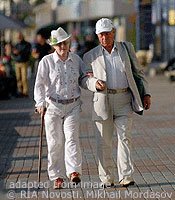Putin Balks at Pension Threats as Aging Russians Hold Trump Card

(Bloomberg – bloomberg.com – Henry Meyer – October 21, 2012)
Nina Sultankina is telling Vladimir Putin to ignore Russia’s ticking pensions time bomb.
As the 50-year-old road supervisor counts the days until she can retire and tend to her failing health in 2016, she is refusing to work longer and not even the Russian president can change her mind.
“I gave my whole working life to the government and now I have another 15 years to live at the most,” said Sultankina, who lives in Russia’s southern Urals and turns 51 next month. “I don’t want to work until I drop dead.”
Sultankina — and the legion of Russians who grew up with the cradle-to-grave state care of the Soviet Union — are holding Putin, 60, hostage to his election promise to keep the retirement age unchanged six months after he returned to Russia’s presidency.
Pension spending will rise to 14 percent of gross domestic product by 2030 from 9 percent, Standard & Poor’s said. There is an “urgent need” for measures to curb the rise in retirement costs, according to VTB Capital. Government debt may rise to 70 percent of GDP by 2030 from about 10 percent this year, if the pension deficit is financed through borrowing, it said.
“Taking this decision now would enable a gradual rise in the pension age to eliminate the deficit,” Maxim Oreshkin, the bank’s chief economist, said by phone.
Putin is resisting pressure from within his Cabinet and from investors to raise the retirement age, threatening to boost state debt, hobble growth and undermine a rally in government bonds that has led to record-low borrowing costs.
Government Plan
He is considering a plan he received this month from the government, which calls for tapping into savings channeled to individual nest eggs to pay for current obligations. The proposal, to be submitted to lawmakers by Dec. 15, doesn’t include raising the retirement age, amounting to a rejection of such calls by the Health and Finance Ministries, leaked to the media in April. (APR)
After unprecedented anti-Putin unrest over alleged election fraud, which was concentrated in Russia’s biggest cities and driven by middle-class voters, the potential increase in the retirement age is riling up a wider portion of society across the country of 143 million people. That raises the risk of another wave of unrest.
“Putin in the run-up to the election promised that there wouldn’t be an increase in the pension age, so that’s why we supported him,” said Mikhail Shmakov, head of the Federation of Independent Trade Unions, which has 22 million members. “If we want to provoke street protests, let’s go down that path. We’ll end up like Libya.”
‘Rise Sharply’
Hundreds of thousands of mainly elderly people protested across Russia in 2005 when the government replaced in-kind social benefits with cash payments. Russia’s 40 million pensioners account for more than 36 percent of the electorate “and that number is set to rise sharply,” said Jenia Ustinova, an analyst at New York-based Eurasia Group.
“Such an unpopular decision as a rise in the pension age would cause a collapse in Putin’s political support,” said Sergei Markov, a former lawmaker in the ruling United Russia party. “It would be an extremely dangerous step.”
Putin’s backing is at 44 percent, after bottoming out at 41 percent last month, according to a survey by the Moscow-based Public Opinion Foundation, or FOM, published Oct. 11. The Russian leader won the March presidential election with 64 percent of the vote. FOM polled 3,000 Russians Oct. 6-7. No margin of error was given.
Stalin-Era Rule
Russia has one of the world’s lowest retirement ages, set in 1932 during the Stalin era. Women can stop work at 55 and men at 60. Average life expectancy, at 43 years in the 1920s, is 70 and will reach 80 by 2050, according to the United Nations.
Professions with a right to early retirement, a heritage of Soviet times, include state bureaucrats, military personnel, miners, geologists, and ballet dancers. The average pension age is 54 for women and 58 for men, according to the IMF.
The IMF says Russia should raise the pension age uniformly for men and women to 63 by 2030 and to 65 by 2050.
Five percent of Russians support a higher retirement age and 42 percent want the government to spend more on pensions, according to an Aug. 17-21 poll by the independent Levada Center.
Not Enough
The Russian Cabinet proposals that fall short of raising the retirement age won’t reach the government’s goal, said former Finance Minister Alexei Kudrin, who oversaw nine consecutive budget surpluses through 2008 and cut state debt from 50 percent of GDP to 10 percent.
“The sooner” the retirement age is increased, “the better it will be for pensioners, taxpayers and for the country,” Kudrin, who runs the Committee of Civil Initiatives research groups, wrote in an article in the journal Economic Issues in March.
The health ministry and the Pension Fund circulated proposals in April to raise the threshold to 60 for women by 2029 and to 65 universally by 2047, according to Russian newspaper reports. The finance ministry proposed to gradually raise the retirement age to 63 years from 2015 to eliminate the deficit by 2029.
These reports alarm people like Sultankina and Nikolai Belayev, 57, an employee for state-owned Russian Railways at a carriage-making plant in Tambov, around 450 kilometers (280 miles) south of Moscow. A factory worker for 43, he also complains that his health is failing though he doesn’t drink and exercises regularly.
“My goal is survive until I retire,” said Belayev. “Half of the people I know don’t live to 60. If they raise the pension age, who will be around to get their pension? How can you promise one thing to the world, and do another?”
Article also appeared at http://www.bloomberg.com/news/2012-10-21/putin-balks-at-pension-threats-as-aging-russians-hold-trump-card.html
